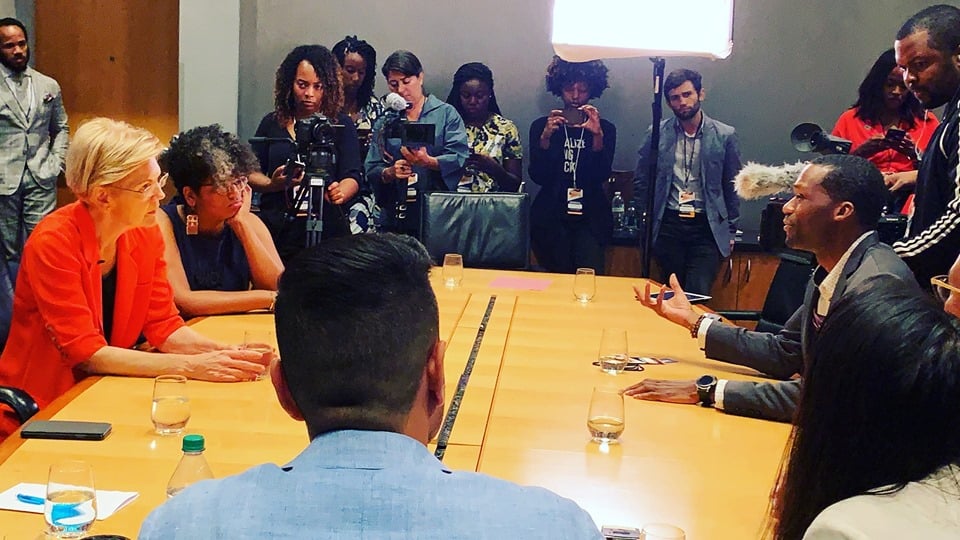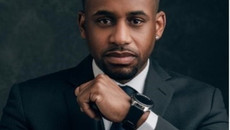Johnny Perez '18; Prisons Program at the National Religious Campaign Against Torture

When USA Today set out to find "the next John Lewis" for its 2020 Leaders of Change feature, the national newspaper looked no further than the St. Francis College community.
Johnny Perez '18, Director of U.S. Prisons Program at the National Religious Campaign Against Torture (NRCAT), was named to the list that identifies people "with the ability to rise up and lead the nation through the chaos of today's civil rights fight."

"It was really an honor and a surprise because we don't do this work for recognition," said Perez, about being among the 20 people singled out by the paper. The list also includes Washington D.C. mayor Muriel Bowser, acclaimed writer Ta-Nehisi Coates and NFL activist Colin Kaepernick.
After serving 13 years in prison – including three in solitary confinement – Perez dedicated his life to advocating for individuals who are currently or formerly incarcerated and to help put an end to unjust policies and practices embedded in the criminal justice system. On his journey, he received a B.S. in Criminal Justice from St. Francis College as part of the Post-Prison Program, an initiative that enrolls formerly incarcerated women and men at SFC so they can earn degrees here.
Perez has remained closely involved with the College even after graduating. He regularly leads panel discussions and lectures open to students, faculty and staff. He curated an interactive exhibit, "Solitary Confinement is Torture," that simulated the reality of individuals relegated to these often-inhumane scenarios, as part of the Prison, Programs & Reentry Possibilities Conference hosted by the College in November 2018.
In his current job, Perez, who came out of prison in 2013 and began studying at SFC in 2014, aims to put an end to solitary confinement in the U.S. prison system.
Perez's article for USA Today's Leaders of Change feature is available online USA Today Leaders of Change: Johnny Perez. He recently reflected in the recognition and his relationship with St. Francis College.
What do you hope media coverage like that from USA Today does for you and your work?
The goal is to change the culture.
The goal is to change the narrative... about those who are still [in prison].
There is a lot of work and even money going into efforts that keep people out of prison...But little work is being done for the people who are in there now.
What happens inside [prison] is so connected to public safety that it's flabbergasting to me how ignored it is. We give ourselves permission to turn a blind eye because these folks are considered "criminals," for lack of a better term.
I hope [more people] get to know people that are [in prison], talk to them. You'll find that the folks in there are literally no different than folks on the outside. If we value compassion and second chances but we ignore the people inside [prison], that's cognitive dissonance. We either have to change our belief system or behave differently.
Why is promoting education important for the work you do?
Educational institutions usually serve as gatekeepers to being able to be a participant in society.
When you get a degree, you automatically have access to this entire world that in some respects wasn't accessible to you before. It's not only the network but the prestige that comes with having a degree. It says, "I'm qualified." It's a piece of paper that says, "I know what I say I know" and it's co-signed by an institution.
So on the one hand, [formal] education creates access for traditionally disenfranchised people. On the other hand, it's important because when you look at any movement for equality, it's always been led by those who have been impacted. Educating these folks, allowing them to take that education, and doing what they want with it, it allows them to step into leadership.
Tell us about your relationship with St. Francis College.
I was released from prison with about 60 [college] credits that I gained throughout my incarceration. I was ineligible for financial aid as a direct result of immigration consequences (having been born in Havana Cuba) and [my] conviction.
I met Dr. [Emily] Horowitz [SFC Professor of Sociology and Co-Director of the SFC Post-Prison Program] through Sean Pica who leads the Hudson Link program [note: read more about Hudson Link]. I went through the interview process just like [all] other students [applying for the Post-Prison Program]. I then got accepted.
I took the opportunity...to change the narrative among other [SFC] students who had never come in contact with someone like me, who did 13 years in prison. They probably had a million questions to ask but never had someone to sit down with or study with side by side. I like to think one of my contributions to [SFC] was challenging students – and even professors – around this narrative about what it means to be formerly incarcerated and to re-enter society.
I remained connected to Dr. Horowitz [after graduation] and was available to the school however I could be of assistance. And I was also intentional. As a place of learning, I noticed there were conversations happening at the school that maybe could be happening more frequently or differently. So I said, "Hey, I'm happy to do some programming at the school," whether it's panel discussion or lecturing in classes to make sure the students and even faculty are hearing directly from people that they read about in textbooks.
My hope is to continue supplementing the quality education people are already getting in the [SFC] classroom, adding some real-life flavor to it. Also, the majority of my interns are from St. Francis College.
How did you make your way to your current job?
When I was first released, I worked for the Urban Justice Center's mental health project. I worked re-entry, helping people with mental health challenges who have histories of incarceration. I helped them pick up the pieces: food stamps, SSI, helped them with housing, helped them get medications, use their phones.
While there, I was constantly called upon to share the experiences of what it feels like to be inside of prison. I always want students to understand that when people are coming out [of prison], no one accepts us. We gravitate towards places where we feel accepted. So here it is, I have a job that is directly speaking to my experience of being incarcerated.
NRCAT was an organization that was giving me speaking opportunities while at my last job. Next thing you know, I was hired as the Director of U.S. Prisons Program [in 2017].
What role did St. Francis College play in your success?
With any accomplishment that I achieved, each of [my SFC] classes and professors had something to do with it...I definitely would not be where I am today without education, and St. Francis played a huge, critical role in my obtaining education.

